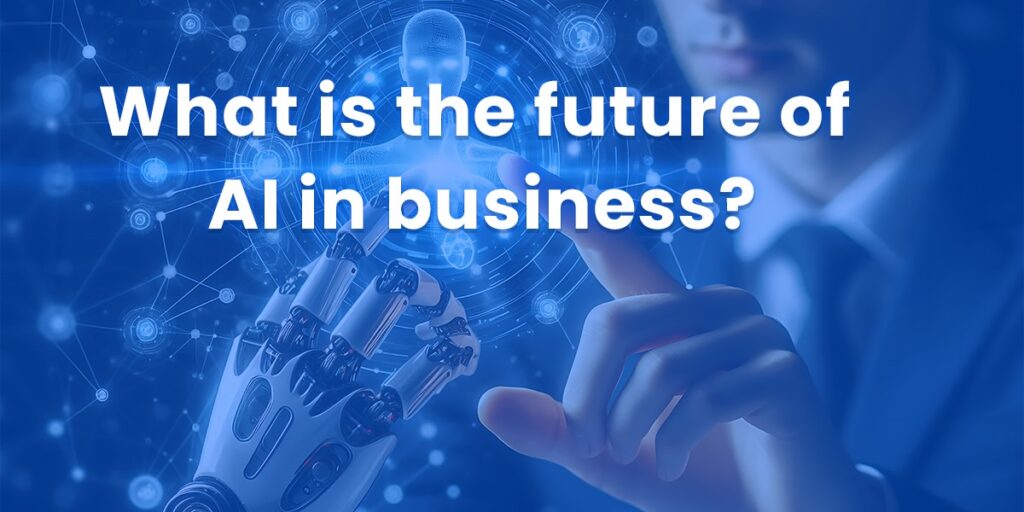Nowadays a very hot topic that is discussed everywhere is about what is the future of AI in businesses. The main reason for this question is that AI has revolutionized each field.It impacts not just one company but the majority of businesses use AI in their operations to increase productivity. 62% of company leaders from different fields have invested in decisions to use AI to support their staff. 71% reported a good ROI, while 72% reported enhanced staff productivity.
After the release of Chatgpt, everyone became aware of AI and more companies are exploring the possibilities to have some form of machine learning in their operations.
In an interview, this question was asked by a famous AI expert and author Kai-Fu Lee who replied:
“AI will be a ubiquitous and omni-use technology that brings dramatic changes to industries such as transportation, manufacturing, health care, retail—almost every imaginable industry. The technology behind AI is a set of algorithms that takes data and makes decisions, predictions, and classifications in ways that previously required human intelligence. If companies don’t embrace AI, they will quite simply be left behind.”
These thoughts show that AI is an important part of each business. But how can these businesses get help from AI? Let’s discuss in detail:
Future of AI for Different Businesses:
AI’s commercial journey begins with basic automation and data analysis. However, more recent advances have pushed AI into increasingly complicated areas. AI technologies have developed throughout time to provide innovative solutions that improve decision-making, simplify processes, and promote creativity. These solutions range from machine learning and natural language processing to deep learning.
AI-Powered Customer Experience
Customer experience (CX) is one of the key areas where artificial intelligence (AI) is growing. Businesses are using AI to build smooth, customized interactions. AI helps in the following areas of Customer Experience:
Artificial intelligence-powered chatbots and virtual assistants are increasingly responding to consumer inquiries with 100% of accuracy and efficiency. This lowers operating expenses while also raising customer satisfaction.
AI technologies enable representatives to reply to inquiries more quickly, while chatbots provide the foundation for 24/7 support.
AI also offers omnichannel support for your online sales and marketing campaigns. That’s why 89% of marketing professionals who participated in the survey said that generative AI usually raises the quality of their content. 84% of bloggers believe that automation and artificial intelligence improve their ability to match online content with search intent.
Businesses can expect customer needs and preferences by using AI-driven predictive analytics, which results in customized marketing plans and product suggestions. The precision with which AI algorithms can predict consumer behavior will increase with their development, revolutionizing the way that companies interact with their target market.
Revolutionizing Supply Chain Management
AI is transforming supply chain management by improving efficiency and visibility.
- Businesses can manage inventory levels, save waste, and guarantee that items are available when required by using AI-powered demand forecasting.
- Businesses can actively handle any problems by using machine learning algorithms to examine massive volumes of data, find trends, and forecast interruptions.
- Furthermore, AI is making it possible for drones and driverless cars to simplify delivery and logistical procedures. This lowers labor and transportation expenses in addition to speeding up delivery times. I think this is the great benefit of AI in this field.
AI in Human Resources
The way businesses recruit, retain, and manage personnel is changing as a result of the implementation of AI into HR.
- By automating resume screening, matching applicants to job descriptions, and even conducting first interviews via chatbots, AI-powered recruiting technologies are improving the hiring process. This increases the quality of workers while cutting down on the time and resources used in the hiring process.
- AI is also very important for staff retention and engagement. Tools for sentiment analysis can be used to measure employee happiness and spot any problems before they get out of hand.
- AI-driven learning and development systems can offer individualized training plans that assist workers in progressing their careers as well as gaining new skills.
Strategic Advancements Shaping the Future
According to Kai-Fu:
“If we think 20 years out, most of the routine tasks currently executed by humans will have been replaced by AI, so people will need to migrate to things AI cannot do or to new opportunities that AI will create.”
A number of practical developments will influence how AI is used in business. The widespread adoption of AI, which makes AI tools and technology available to companies of all sizes, is one important topic. With the help of cloud-based AI systems, smaller businesses can use AI without having to make large infrastructure investments.
AI and the Internet of Things (IoT)
Business settings will become smarter and more efficient when AI and IoT merge. Real-time data collection and analysis by AI-enabled IoT devices can provide useful findings that improve operational efficiency. AI-enabled smart factories, for example, can enhance product quality, reduce downtime, and simplify the process of production.
AI in Financial Services
The application of AI is causing a revolution in the finance industry.
- Real-time fraud detection and mitigation with artificial intelligence (AI) is improving security.
- With the help of robo-advisors, who offer customized investment advice, financial planning is now more widely available.
- AI is also automating the procedures of monitoring and reporting, which simplifies regulatory compliance. This saves time and money while also lowering the chance of non-compliance.
AI in Healthcare
AI is transforming patient care and operational effectiveness in the healthcare industry.
- AI-powered diagnostic systems can scan medical images with amazing accuracy, helping physicians identify and cure illnesses earlier on.
- Healthcare organizations can maximize resource allocation and save wait times by using predictive analytics to estimate patient admissions.
- AI-driven customized medicine also improves treatment results and lowers side effects by customizing treatment strategies for each patient based on their DNA composition and medical history.

